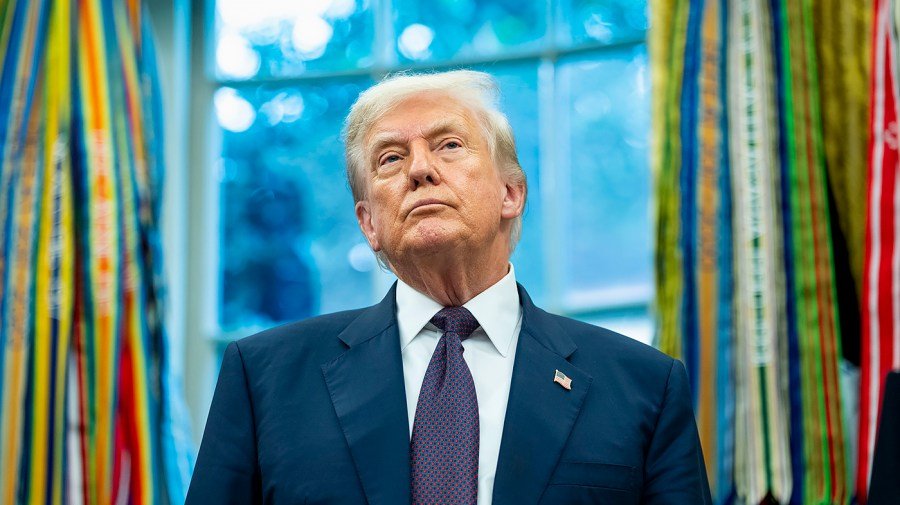The full slate of President Trump’s tariffs went into effect Thursday, his 200th day in office.
Trump celebrated the new tariffs, which will be set between 15 percent and 41 percent for most countries, although some countries are subject to punitive tariffs over separate political matters.
“IT’S MIDNIGHT!!!” Trump posted on social media when the calendar turned to Thursday. “BILLIONS OF DOLLARS IN TARIFFS ARE NOW FLOWING INTO THE UNITED STATES OF AMERICA!”
Federal Reserve Chief Jerome Powell has warned the tariffs will lead to a spike in inflation. Many Republicans oppose tariffs, which they see as a tax on consumers. Trump’s trade war has roiled international relations, leading to threats of reciprocal tariffs and fears of a global economic crunch.
Trump administration officials are resolute and fanned out to hit the airwaves on Thursday in defense of the levies.
“We are just responding to the China shock from the early 2000s,” Treasury Secretary Scott Bessent said on MSNBC’s “Morning Joe.” “So we are trying to rebalance trade in America’s favor.”
So far, the administration has announced a handful of new trade deals, with the European Union, Japan and South Korea leading the way among the U.S.’s larger trade partners.
Trump has delayed imposing higher tariffs on some countries, including China and Mexico, giving them additional time to reach a deal.
The president has imposed higher tariffs on India for continuing to buy Russian oil, and on Brazil, over the prosecution of former President Jair Bolsonaro.
Bessent said other trade deals are “largely done,” allowing the administration to turn to addressing the “affordability crisis.”
“The first step in easing the affordability crisis was to bring down inflation… to address it you’ve got to stop the increase first,” Bessent said. “There are two ways to address it, the affordability crisis, you can stop the inflation and you can have a very strong real wage gains which is what I think this manufacturing renaissance is going to do.”
Commerce Secretary Howard Lutnick focused on tariffs as a new source of revenue for the government that could bring in $1 trillion over the next 10 years.
“I think we’re going to be headed toward $50 billion a month…then you are going to get semiconductors, pharmaceuticals, you are going to get all sorts of additional tariff money coming in,” Lutnick said on Fox Business.
Trump has also threatened new tariffs on specific products, including semiconductors and pharmaceuticals.
An appeals court is weighing whether Trump has the legal authority to impose tariffs under the Emergency Economic Powers Act (IEEPA) of 1977, which the White House has cited as the law underpinning Trump’s trade war.
MORE INTERNATIONAL NEWS…
The Kremlin said Thursday that Russian President Vladimir Putin might meet with Trump “next week” about bringing an end to the war with Ukraine.
This comes after Trump’s special envoy Steve Witkoff met with Putin for three hours in Moscow on Wednesday.
Secretary of State Marco Rubio said Witkoff left the meeting with a potential Russia-Ukraine ceasefire proposal.
U.S. officials say Trump’s tariffs on Russia’s trading partners will still go into effect on Friday, as the president tries to force Putin’s hand. The U.S. has also been selling arms to European nations to be passed along to Ukraine.
Ukrainian President Volodymyr Zelensky said Putin seems “more inclined toward a ceasefire” now.
MEANWHILE…
Israeli Prime Minister Benjamin Netanyahu told Fox News on Thursday that Israel will take full control of Gaza, a major policy shift that breaks with his own military chief, who opposes the expansion.
Netanyahu said Israel doesn’t plan to maintain control over Gaza for the long term, but only until Hamas has been eradicated.
“In order to assure our security, remove Hamas there, enable the population to be free of Gaza and to pass it to civilian governance,” Netanyahu said.
Israel and Hamas have been unable to reach a ceasefire agreement despite the U.S. intervening to seek a peace deal.
Israel has been under pressure to address the humanitarian and hunger crisis in Gaza, while Hamas has refused to release emaciated Israeli hostages.
